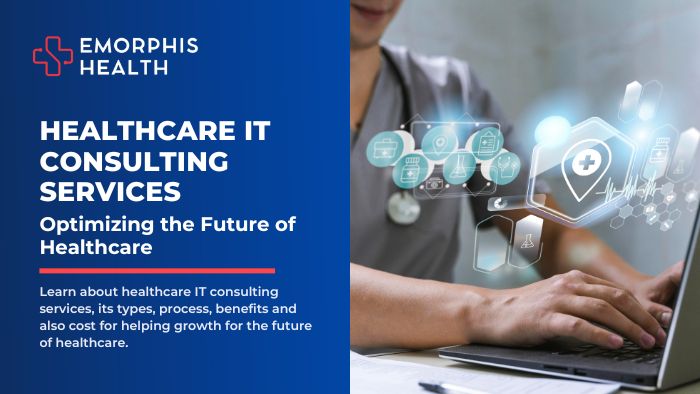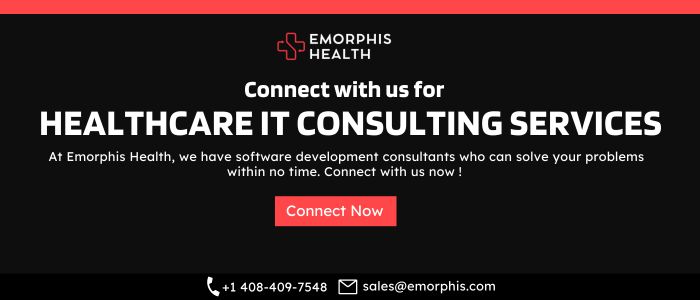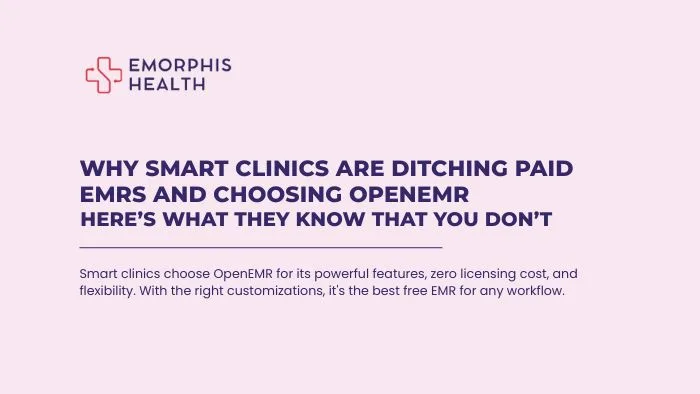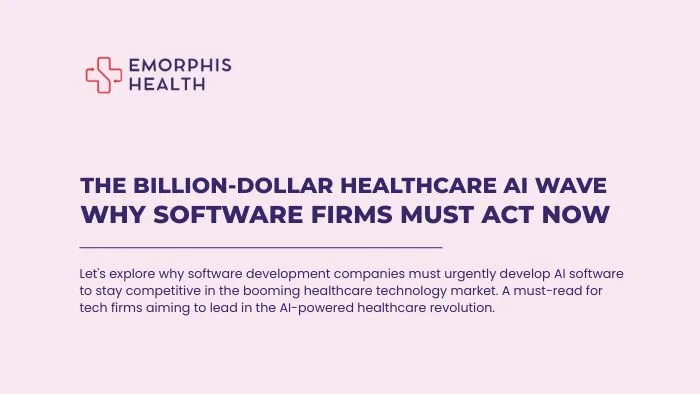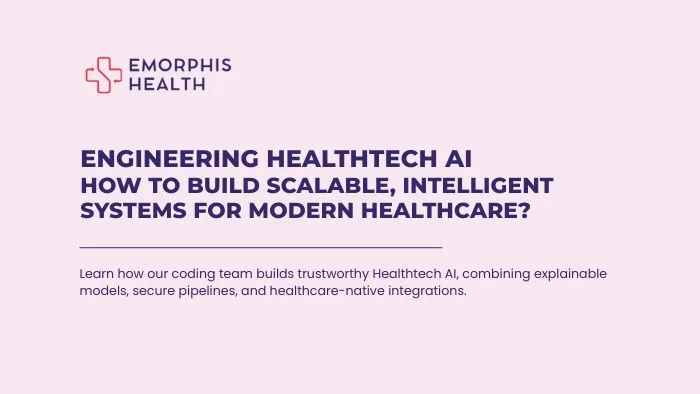Overview
See Contents
- 1 Overview
- 2 The Importance of Healthcare IT Consulting Services
- 3 Stakeholders in the healthcare industry
- 4 How do Stakeholders Benefit From Outsourcing Healthcare IT Services?
- 5 Types of Healthcare IT Consulting Services
- 6 Healthcare IT consulting process
- 7 What kind of Healthcare IT Solutions does Emorphis offer?
- 8 Latest Technologies used in Healthcare IT Solutions development
- 9 What is the Cost of Healthcare IT Consulting Services?
- 10 Conclusion
The healthcare industry has seen significant changes over the past decade with the introduction of digital technologies, electronic health records (EHRs), and a growing focus on patient-centric care. The demand for quality care, better patient outcomes, and cost-effectiveness have led to an increasing need for healthcare IT consulting services. In fact, healthcare IT consulting services help organizations optimize their systems, improve workflows, and align their technology investments with their business goals.
According to a report, in 2022, the size of the global healthcare IT consulting market was $41.3 billion. Looking ahead, IMARC Group anticipates the market to develop at a compound annual growth rate (CAGR) of 16.9% from 2023 to 2028, reaching US$ 113.8 billion.
Healthcare IT consulting services provide healthcare organizations with expert guidance, advice, and support in the selection, implementation, and also optimization of health information technology (HIT) systems. Healthcare IT consultants work with healthcare providers, payers, and other stakeholders to evaluate their existing systems, identify gaps and inefficiencies, and also develop strategies to optimize their operations. Let us check the importance of healthcare IT consulting services and the benefits they offer to healthcare organizations.
The Importance of Healthcare IT Consulting Services
The healthcare industry is undergoing a digital transformation, and healthcare IT consulting services play a critical role in this transformation. Healthcare organizations face several challenges, including rising costs, changing regulations, and increasing patient expectations. Healthcare IT consulting services help organizations address these challenges by optimizing their systems and processes, reducing costs, improving patient outcomes, and also enhancing the patient experience.
1. Improved Workflow Efficiency
Healthcare IT consulting services help healthcare organizations optimize their workflows by identifying areas for improvement and implementing strategies to streamline processes. By optimizing workflows, healthcare organizations can improve patient outcomes, reduce costs, and enhance the overall patient experience.
2. Enhanced Patient Experience
Healthcare IT consulting services can help healthcare organizations implement patient-centric systems and processes that enhance the patient experience. This includes systems that enable patients to access their health records, communicate with their healthcare providers, and also manage their health.
3. Increased Cost Savings
Healthcare IT consulting services help healthcare organizations identify areas of inefficiency and waste in their systems and processes. In fact, by optimizing these areas, healthcare organizations can reduce costs and improve their bottom line.
4. Better Patient Outcomes
Healthcare IT consulting services help healthcare organizations implement systems and processes that improve patient outcomes. This includes systems that enable healthcare providers to access patient data in real-time, track patient progress, and also develop personalized treatment plans.
5. Regulatory Compliance
Healthcare IT consulting services help healthcare organizations stay compliant with the latest regulations and standards. In fact, this includes HIPAA compliance, EHR implementation and optimization, and cybersecurity.
Stakeholders in the healthcare industry
At the heart of the healthcare industry are the patients who seek quality care and outcomes. But behind every successful patient outcome is a range of customers and stakeholders who play a critical role in delivering healthcare services and products. Let’s explore the different customers served in the healthcare industry and their unique needs.
A. Healthcare Providers
Healthcare providers are organizations that offer medical services to patients, including hospitals, outpatient clinics, diagnostic labs, and also long-term care facilities. These providers rely on technology to improve the quality of care, reduce medical errors, and increase efficiency. Healthcare IT consulting services play a crucial role in helping healthcare providers select, implement, and optimize their health information technology (HIT) systems, such as electronic health records (EHRs) and clinical decision support systems (CDSSs). Healthcare providers also rely on medical device manufacturers to provide reliable and effective medical devices and equipment to diagnose and treat patients.
B. Medical Device Manufacturers
Medical device manufacturers design, develop, and manufacture medical devices and equipment such as diagnostic tools, imaging systems, and prosthetics. These manufacturers are responsible for ensuring the safety and efficacy of their products while adhering to regulatory guidelines and standards. Healthcare IT consulting services can help medical device manufacturers comply with regulations such as the FDA’s Unique Device Identification (UDI) requirements and track and trace systems.
C. Digital Health Startups and Software Product Companies
Digital health startups and software product companies are driving innovation in the healthcare industry. These companies are developing cutting-edge technologies such as artificial intelligence (AI), telemedicine, and wearable devices that are transforming the way healthcare is delivered. Healthcare IT consulting services can help these companies develop and implement HIT systems that are secure, scalable, and compliant with industry regulations.
D. Pharmaceutical Companies
Pharmaceutical companies develop, produce, and market medications and other pharmaceutical products such as vaccines, medical devices, and over-the-counter drugs. These companies require robust supply chain management systems to ensure the safety and efficacy of their products. Healthcare IT consulting services can help pharmaceutical companies develop and implement supply chain management systems that enable end-to-end traceability and also comply with regulatory guidelines.
The healthcare industry is a complex and interconnected ecosystem that involves multiple stakeholders, including healthcare providers, medical device manufacturers, digital health startups, and pharmaceutical companies. Healthcare IT consulting services can help these customers develop and implement HIT systems, comply with regulations, and also improve patient outcomes. By understanding the unique needs of each customer, healthcare IT consulting services can provide tailored solutions that drive value and enable long-term success.
How do Stakeholders Benefit From Outsourcing Healthcare IT Services?
Outsourcing healthcare IT services can provide several benefits for stakeholders in the healthcare industry. These benefits include:
- Access to Expertise: Healthcare IT service providers employ experienced professionals who have specialized knowledge in areas such as health information technology, regulatory compliance, and cybersecurity. By outsourcing IT services, stakeholders can tap into this expertise and leverage it to improve their operations and enhance patient outcomes.
- Reduced Costs: Outsourcing healthcare IT services can help stakeholders reduce their operating costs by eliminating the need to hire and train in-house IT staff. IT service providers can offer more cost-effective solutions by leveraging economies of scale, reducing overhead expenses, and in fact, utilizing the latest technology.
- Increased Efficiency: By outsourcing IT services, stakeholders can free up internal resources and focus on core competencies such as patient care. Healthcare IT service providers can help stakeholders optimize their IT systems, streamline workflows, and automate processes, resulting in increased efficiency and productivity.
- Improved Compliance: Compliance with regulatory guidelines such as HIPAA and GDPR is critical for stakeholders in the healthcare industry. Healthcare IT service providers can help stakeholders stay up-to-date with changing regulations and ensure that their IT systems are secure and compliant.
- Enhanced Security: Cybersecurity threats pose a significant risk to the healthcare industry, and stakeholders must take measures to protect patient data and confidential information. Healthcare IT service providers can help stakeholders implement robust security measures, such as data encryption, firewalls, and intrusion detection systems, to safeguard against cyber threats.
As a matter of fact, outsourcing healthcare IT services can provide numerous benefits for stakeholders in the healthcare industry. Now, let’s check with various types of Healthcare IT consulting services.
Types of Healthcare IT Consulting Services
Healthcare IT consulting services provide a range of options to support organizations in achieving their IT goals. Here are some of the key healthcare IT consulting service options available:
a) Assessment of the Existing IT Environment
Before making any significant IT investments, it’s crucial to assess the current IT environment. An IT assessment can help identify areas for improvement, gaps in functionality, and opportunities for cost savings. IT consultants can conduct a thorough evaluation of the existing IT infrastructure, including hardware, software, and network components, and provide recommendations for optimizing the environment.
b) IT Strategy Consulting
Developing an IT strategy is critical for achieving an organization’s long-term goals. In fact, IT strategy consulting can help healthcare organizations align their technology investments with their business objectives, identify key performance indicators (KPIs), and develop a roadmap for achieving their goals. An IT consultant can work with an organization’s leadership team to develop a comprehensive IT strategy that addresses both short-term and long-term objectives.
c) Medical Solution Consulting
Medical solution consulting can help healthcare organizations identify and implement technology solutions that improve patient outcomes and increase efficiency. In fact, medical solution consultants work with healthcare providers to understand their unique needs and recommend solutions that address those needs. Electronic health records (EHRs), clinical decision support systems (CDSSs), telemedicine solutions, and also other medical software solutions may be a part of these solutions.
d) Healthcare Software Optimization and Modernization
As healthcare technology evolves, healthcare organizations need to ensure that their software solutions are up-to-date and optimized for efficiency and performance. Healthcare software optimization and modernization services can help organizations improve the usability, functionality, and in fact, performance of their software solutions.
e) Migration to a HIPAA-Compliant Cloud
Healthcare organizations need to ensure that their data is secure and compliant with regulatory guidelines such as HIPAA. One way to achieve this is by migrating to a HIPAA-compliant cloud environment. Healthcare IT consulting services can help organizations migrate their data to a secure cloud environment that meets regulatory guidelines and also provides high availability and disaster recovery capabilities.
f) Healthcare IT Support
Healthcare IT support services provide organizations with the technical support they need to maintain and optimize their IT systems. In fact, IT support services may include help desk support, hardware and software maintenance, system upgrades, and network administration.
g) Healthcare Software Development
Healthcare organizations may require customized software solutions that address their unique needs. Healthcare software development services can help organizations develop and implement software solutions that are tailored to their specific requirements.
h) Integration of Healthcare Software
Healthcare organizations often use a variety of software solutions from different vendors. Integrating these solutions can be a complex and time-consuming process. Healthcare IT consulting services can help organizations integrate their software solutions to improve efficiency and also streamline workflows.
i) Healthcare Cybersecurity and HIPAA Compliance Assessment
Ensuring that healthcare data is secure and compliant with regulatory guidelines is critical. As a matter of fact, healthcare IT consulting services can help organizations assess their cybersecurity and HIPAA compliance posture resulting in providing recommendations for improving security and compliance.
j) Healthcare Data Analytics
Healthcare organizations generate vast amounts of data, from patient health records to financial data. Healthcare data analytics services can help organizations leverage this data to gain insights into patient outcomes, clinical workflows, and financial performance. Data analytics can also be used to identify opportunities for cost savings, improve patient care, and optimize workflows. Healthcare IT consultants can help organizations implement data analytics solutions, develop data governance policies, and provide training on data analysis tools and techniques.
k) Vendor Selection and Contract Negotiation
Healthcare organizations often need to select vendors for their IT solutions, ranging from electronic health records to medical devices and software. The vendor selection process can be time-consuming and complex, and making the wrong choice can have significant implications for an organization’s IT strategy. Healthcare IT consulting services can help organizations identify potential vendors, evaluate their products and services, and negotiate contracts that align with their business goals and budget.
l) Revenue Cycle Management
Revenue cycle management (RCM) is the process of managing the financial aspects of patient care, from registration to claim submission and payment. In fact, for healthcare organizations to get timely and accurate payment for the services they offer, RCM is essential. Healthcare IT consulting services can help organizations optimize their RCM processes by identifying areas for improvement, implementing best practices, and also leveraging technology solutions to automate and streamline workflows. RCM consulting services can help healthcare organizations improve cash flow, reduce denials, and in fact, improve patient satisfaction by providing a more efficient and transparent billing process.
m) Telehealth and Telemedicine App Development
Telehealth is the delivery of healthcare services and information through digital communication technologies, such as video conferencing and mobile applications. Telehealth has become increasingly popular in recent years, particularly due to the COVID-19 pandemic, which has highlighted the importance of remote access to healthcare services. Healthcare IT consulting services can help organizations implement telehealth solutions, including selecting and integrating telehealth platforms, developing telehealth workflows and policies, and in fact, even creating custom telemedicine apps tailored to their specific needs. Telehealth and telemedicine app development solutions consulting services can help healthcare organizations improve patient access to care, reduce costs, and improve patient outcomes through remote monitoring and communication.
n) Healthcare Business Intelligence
Healthcare business intelligence (BI) refers to the use of data analytics and reporting tools to analyze healthcare data and provide insights to improve business operations and patient care. Healthcare IT consulting services can help organizations implement BI solutions that integrate data from multiple sources, including electronic health records, financial systems, and operational data. BI consulting services can help healthcare organizations improve decision-making, optimize workflows, and reduce costs by providing real-time insights into patient care and operational performance.
0) Interoperability Consulting
Interoperability is the seamless exchange and use of patient data between various healthcare systems and apps. Interoperability is critical for improving patient care coordination and reducing errors, as well as for enabling data analytics and population health management. Healthcare IT consulting services can help organizations improve interoperability by identifying gaps in their systems and workflows, recommending standards and protocols for data exchange, and implementing solutions that enable seamless data sharing. Interoperability consulting services can help healthcare organizations improve patient outcomes, reduce costs, and improve efficiency by breaking down data silos and enabling better data sharing across systems.
Healthcare IT consulting services offer a range of options to support healthcare organizations in achieving their IT goals. By leveraging these services, healthcare organizations can improve efficiency, optimize their IT systems, and deliver better patient care.
Once a healthcare organization decides to pursue IT consulting services, it is important to understand the consulting process. Let’s explore the process.
Healthcare IT consulting process
The medical IT consulting process is critical for healthcare organizations to optimize their technology systems, improve patient care, and ensure regulatory compliance. The process typically involves several steps, including assessment, strategy development, solution selection and implementation, and ongoing support and optimization.
- Assessment: The first step in the process is to assess the current IT environment to identify areas for improvement and potential risks. This may involve evaluating the existing systems and workflows, reviewing policies and procedures, and conducting a security and compliance audit.
- Strategy Development: Based on the assessment, the next step is to develop an IT strategy that aligns with the organization’s overall goals and objectives. This may involve selecting and implementing new IT solutions, optimizing existing solutions, and developing policies and procedures for IT operations. The strategy should consider the organization’s budget, timeline, and resources, as well as any regulatory requirements or industry standards.
- Solution Selection and Implementation: Once the IT strategy has been developed, the next step is to select and implement the solutions that will support it. This may involve evaluating different software and hardware options, conducting vendor assessments, and negotiating contracts. The implementation process should be carefully planned and managed to ensure that the systems are configured correctly, data is migrated smoothly, and users are trained effectively.
- Ongoing Support and Optimization: Finally, once the solutions have been implemented, ongoing support and optimization are required to ensure that the IT systems remain secure, compliant, and effective. This may involve providing user support, monitoring and managing the systems, and implementing updates and upgrades as needed.
What kind of Healthcare IT Solutions does Emorphis offer?
Emorphis Technologies is a healthcare IT consulting firm that offers a range of IT solutions for healthcare providers, including hospitals, clinics, labs, and pharmaceutical companies. Their solutions include:
- EMR and EHR Systems: Electronic Medical Records (EMR) and Electronic Health Records (EHR) are digital versions of patients’ medical records that can be accessed and shared securely across different healthcare providers.
- Healthcare Mobile Apps: Mobile apps can be used to enhance patient engagement and access to healthcare services, such as appointment scheduling, prescription refills, and remote monitoring.
- Telehealth Solutions: Telehealth solutions enable remote consultations and virtual visits, which can improve access to care and reduce costs.
- Revenue Cycle Management Solutions: Revenue cycle management solutions help healthcare organizations manage their billing and payment processes more efficiently and effectively.
- Healthcare Data Analytics and Business Intelligence Solutions: Healthcare data analytics and business intelligence solutions can help healthcare organizations make better decisions based on data insights.
- Healthcare Cybersecurity and Compliance Services: Healthcare cybersecurity and compliance services help organizations protect sensitive patient data and comply with regulations such as HIPAA.
Latest Technologies used in Healthcare IT Solutions development
The healthcare IT industry is rapidly evolving, and new technologies are emerging all the time. Here are some of the latest technologies being used in healthcare IT solutions development:
- Artificial Intelligence (AI) and Machine Learning: AI and machine learning are being used to improve clinical decision-making, automate administrative tasks, and enhance patient engagement. For example, AI-powered chatbots can be used to answer patients’ questions and help them navigate healthcare services.
- Blockchain: Blockchain technology is being used to improve data security and interoperability. Blockchain can help healthcare organizations share patient data securely and transparently across different systems and providers.
- Internet of Things (IoT): IoT devices are being used to improve patient monitoring and data collection. For example, wearable devices can be used to collect patient data and send it to healthcare providers in real time.
What is the Cost of Healthcare IT Consulting Services?
The cost of healthcare IT consulting services can vary depending on a variety of factors. Some consulting firms charge an hourly rate, while others may charge a fixed fee or a percentage of the project cost. Here are some key factors that can impact the cost of healthcare IT consulting services:
- Scope of work: The complexity and scope of the project will have a significant impact on the cost of healthcare IT consulting services. A project that requires extensive research and analysis, as well as the development of a comprehensive solution, will be more expensive than a simple project that requires only a few hours of consulting.
- Experience and expertise: The level of experience and expertise of the consulting team will also play a role in the cost of healthcare IT consulting services. Highly experienced consultants with specialized expertise will typically charge more than less experienced consultants.
- Timeframe: The timeframe for the project will also impact the cost of healthcare IT consulting services. Urgent or short-term projects may require more resources and higher fees.
- Travel and expenses: If the consulting team needs to travel to a client site or incur other expenses, such as hardware or software costs, these expenses will be factored into the overall cost.
Cost of Healthcare IT Consulting Services
Calculating the cost of healthcare IT consulting services will depend on the billing method used by the consulting firm. Hourly rates typically range from $100 to $300 per hour but can be higher for specialized expertise. Fixed fees may be charged for specific services, such as an IT assessment or software optimization, and can range from a few thousand dollars to tens of thousands of dollars. Some firms may also charge a percentage of the project cost, which can range from 10% to 30% or more.
It is important for healthcare organizations to carefully evaluate the cost of healthcare IT consulting services and ensure that they are receiving value for their investment. A reputable consulting firm should provide a detailed proposal outlining the scope of work, timeline, and costs, as well as references and case studies demonstrating their experience and expertise. By selecting the right consulting partner, healthcare organizations can ensure that they are making informed decisions about their IT investments and achieving their strategic goals.
Conclusion
In conclusion, healthcare IT consulting services are crucial for healthcare organizations looking to optimize their operations, improve patient care, and stay competitive in a rapidly evolving industry. With a wide range of services available, including IT assessment, strategy consulting, medical solution consulting, software optimization, cybersecurity, and more, healthcare organizations can partner with consulting firms to achieve their strategic goals and improve patient outcomes. Emorphis Technologies is one such firm that offers a comprehensive suite of healthcare IT solutions, utilizing the latest technologies and industry best practices. By carefully evaluating the cost and value of IT consulting services and selecting the right consulting partner, healthcare organizations can leverage technology to drive innovation and improve the quality of care they provide to patients.

